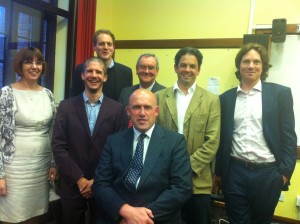This is the first of a series of blogs as part of the Ideas in Education series in the RSA South Central region. This guest blog is from Mike Grenier FRSA, House Master at Eton College who ran an event in June on Slow Education.
The first aim of the Ideas In Education series is to share ideas, old and new, in and around education. The second aim is to inspire people to create or support projects and developments taking place in the field of education across the South Central region of the RSA.
The Idea: Slow Education
Slow Education looks to place the relationship between teacher, pupil, school and community at the heart of education. The Slow Education movement celebrated its first birthday with a seminar as the first of the RSA South Central region's ‘Ideas in Education’ series, held at Eton College. I started the event by outlining the principles of Slow Education, emphasising the movement’s ambition to build bridges across all sectors of the educational establishment in order to provoke debate and attempt to find consensus about a methodology that would improve opportunities for learners irrespective of background.
Slow Education looks to place the relationship between teacher, pupil, school and community at the heart of education.
Following on from the context, Joe Harrison, a consultant in the North-West, presented two case studies in the Primary sector: Holy Trinity School, Darwen and St Silas Primary, Blackburn. Joe stressed that each school had explored ways of improving the experience of its students and teachers that were particular to the needs of their communities. Slow Education is not an ‘off the peg’ educational package; it is something organic and specific to each school. What is common to both schools, however, is the ambition to allow learners to have space and time to follow and develop interests towards greater depth and understanding.

The Senior Management Team from Matthew Moss High School in Rochdale then offered an insight into their ‘My World’ programme, a project-based learning initiative that they had introduced into their curriculum in years 7 and 8. They had found that allowing students to choose topics of personal interest had increased self-motivation as well as self-discipline, and that the role of teacher as coach and facilitator had meant stronger personal relationships with the students. Much of the revising and redrafting had allowed students to reflect on appropriate strategies and become more self-aware as learners. Not only were the projects in themselves completed to a high standard but the involvement of adults from the local community in ‘viva voce’ interviews at the end had ensured a sense of rigour to the assessment as well as pride in their performance by the student. In an age of measuring success, the team were pleased to report that even though two lessons per week of English had been given over to ‘My World’ projects, SATs scores in literacy had improved.
The second and shorter part of the event allowed two areas of education to be considered in relation to Slow Education principles: the first being Well-being and Social and Emotional Learning, and the second being the integration of IT and technology in a Slow school. Ian Morris, Head of Well-being at Wellington College, introduced the programme that he has devised that allows students from years 9-13 to develop a better understanding of self and relationships, using some of the principles of Mindfulness, Positive Psychology and the work of Howard Gardner at Harvard. The aim of the programme is to give students and teachers a vocabulary for assessing well-being and methods of reflecting on behaviour, values and character.
And finally James Stanforth, Head of Computing at Eton, showed how the school was developing better ways of engaging students with IT in a rapidly changing world. His approach is to allow students to use technology to share, to collaborate and to engage actively to create immersion projects in Modern Languages. Other projects included drop-in sessions to allow students to learn how to code, how to develop their IT skills and to see technology as a tool to improve their relationships with learning and developing their skills.
What next?
On the evening itself we asked guests to think about how they might use the principles of slow education in their own lives, and also to think about how they could support and develop slow education across the South Central region.
So did the event achieve its aims? We certainly filled the first criteria - the event had an unbelievably buzzing atmosphere and a number of conversations simultaneously taking place between people sharing great ideas. As for the second aim we know that attendees have engaged via email, on Twitter and in person to discuss ideas. We hope that these ideas will spark inspiring new projects and connections across the region.
Visit the Slow Education website to learn more.
Be the first to write a comment
Comments
Please login to post a comment or reply
Don't have an account? Click here to register.